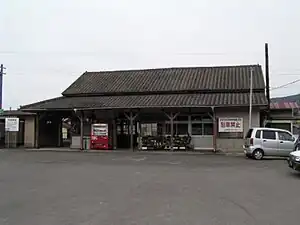Yamamoto Station 山本駅 | |
|---|---|
 Yamamoto Station in 2005 | |
| General information | |
| Location | Japan |
| Coordinates | 33°23′34″N 129°58′52″E / 33.39278°N 129.98111°E |
| Operated by | |
| Line(s) | |
| Distance |
|
| Platforms | 1 side + 1 island platforms |
| Tracks | 3 + 2 sidings |
| Construction | |
| Structure type | At grade |
| Other information | |
| Status | Unstaffed |
| Website | Official website |
| History | |
| Opened | 1 December 1898 |
| Passengers | |
| FY2015 | 314 daily |
| Location | |
 Yamamoto Station Location within Japan | |
Yamamoto Station (山本駅, Yamamoto-eki) is a train station in Karatsu, Saga Prefecture, Japan. It is operated by JR Kyushu and is a transfer station for the Karatsu and Chikuhi lines.[1][2]
Lines
The station is served by the Karatsu Line and is located 32.9 km from the starting point of the line at Kubota. The station is also the starting point for the western section of the Chikuhi Line to Imari. Trains of the Chikuhi Line use the Karatsu Line tracks from Karatsu to here before rejoining the Chikuhi Line track towards Imari.[3]
Station layout
The station consists of a side and an island platform serving three tracks at grade with two sidings branching off track 1. The station building is an old timber structure of traditional Japanese design with a double tiled roof. It is unstaffed and serves only to house a waiting room and an automatic ticket vending machine. Access to the island platform is by means of a level crossing with steps.[2][3][4]
Adjacent stations
| ← | Service | → | ||
|---|---|---|---|---|
| Karatsu Line | ||||
| Honmutabe | Local | Onizuka | ||
| Chikuhi Line (western section) | ||||
| Terminus | Local | Hizen-Kubo | ||
History
On 1 December 1898, the private Karatsu Kogyo Railway opened the station as the southern terminus of a track which it had built down the west bank of the Matsuura River from Miyoken (now Nishi-Karatsu). Yamamoto became a through-station on 13 June 1899 when the track was extended to Kyūragi. On 23 February 1902, the company, now renamed the Karatsu Railway, merged with the Kyushu Railway. When the Kyushu Railway was nationalized on 1 July 1907, Japanese Government Railways (JGR) took over control of the station. On 12 October 1909, the line which served the station was designated the Karatsu Line.[5]
The private Kitakyushu Railway, which had a track between Hakata and Higashi-Karatsu by 1926 also expanded southwards a separate, parallel route down the east bank of the Matsuura River, establishing its southern terminus at Yamamoto on 20 June 1929. By 1935, the track had been extended west from Yamamoto to Imari. The Kitakyushi Railway was nationalised on 1 October 1937 and JGR, now in control, designated the track from Higashi-Karatsu through Yamamoto to Imari as part of the Chikuhi Line. For many years thereafter, Yamamoto was the only transfer station between the Karatsu and Chikuhi Line. On 22 March 1983, a new route for the Chikuhi Line was opened, with Highashi-Karatsu relocated and a through-track built across the Matsuura River from there via Watada to Karatsu. The stretch of track from Higashi-Karatsu down the east bank of the Matsuura River was closed. Chikuhi Line trains now used the Karatsu Line track down the west bank from Karatsu to reach Yamamoto before rejoining the western section of Chikuhi Line to Imari.[6][7]
With the privatization of Japanese National Railways (JNR), the successor of JGR, on 1 April 1987, control of the station passed to JR Kyushu.[8]
Yamamoto was also the terminal for a number of branch lines which have since closed. A branch to Ōchitankō opened in 1905 for freight closed in 1978. Another freight line to Kanokuchi opened in 1909 and closed in 1912. A branch to Kishitake opened in 1912 and closed in 1971.[9]
Passenger statistics
In fiscal 2015, there were a total of 114,541 boarding passengers, giving a daily average of 314 passengers.[10]
Environs
- Karatsu Technical High School
- Saga Prefectural Hokubu School for the Handicapped
- National Route 203
References
- ↑ "JR Kyushu Route Map" (PDF). JR Kyushu. Retrieved 3 March 2018.
- 1 2 "山本" [Yamamoto]. hacchi-no-he.net. Retrieved 31 March 2018.
- 1 2 Kawashima, Ryōzō (2013). 図説: 日本の鉄道 四国・九州ライン 全線・全駅・全配線・第5巻 長崎 佐賀 エリア [Japan Railways Illustrated. Shikoku and Kyushu. All lines, all stations, all track layouts. Volume 5 Nagasaki Saga area] (in Japanese). Kodansha. pp. 15, 80, 82. ISBN 9784062951647.
- ↑ "山本" [Yamamoto]. Retrieved 31 March 2018. Blog entry with good photographic coverage of station facilities.
- ↑ Ishino, Tetsu; et al., eds. (1998). 停車場変遷大事典 国鉄・JR編 [Station Transition Directory – JNR/JR] (in Japanese). Vol. I. Tokyo: JTB Corporation. pp. 223–4. ISBN 4-533-02980-9.
- ↑ Ishino, Tetsu; et al., eds. (1998). 停車場変遷大事典 国鉄・JR編 [Station Transition Directory – JNR/JR] (in Japanese). Vol. I. Tokyo: JTB Corporation. pp. 224–5. ISBN 4-533-02980-9.
- ↑ JR Kyushu (2013). JR九州のひみつ [Secrets of JR Kyushu] (in Japanese). PHP Institute, Inc. pp. 82–83. ISBN 9784569814933.
- ↑ Ishino, Tetsu; et al., eds. (1998). 停車場変遷大事典 国鉄・JR編 [Station Transition Directory – JNR/JR] (in Japanese). Vol. II. Tokyo: JTB Corporation. p. 720. ISBN 4-533-02980-9.
- ↑ Imao, Keisuke (2009). 日本鉄道旅行地図帳 12号 九州 沖縄―全線・全駅・全廃線 [Japan Rail Travel Atlas No. 12 Kyushu Okinawa - all lines, all stations and disused lines] (in Japanese). Mook. pp. 22, 54. ISBN 9784107900302.
- ↑ "佐賀県統計年鑑(平成28年版)" [Saga Prefecture Statistics Yearbook 2016 Edition]. Saga Prefectural Government website. Retrieved 23 March 2018. See table 12-7 at section under Transportation and Communications.
External links
- Yamamoto Station (JR Kyushu)(in Japanese)